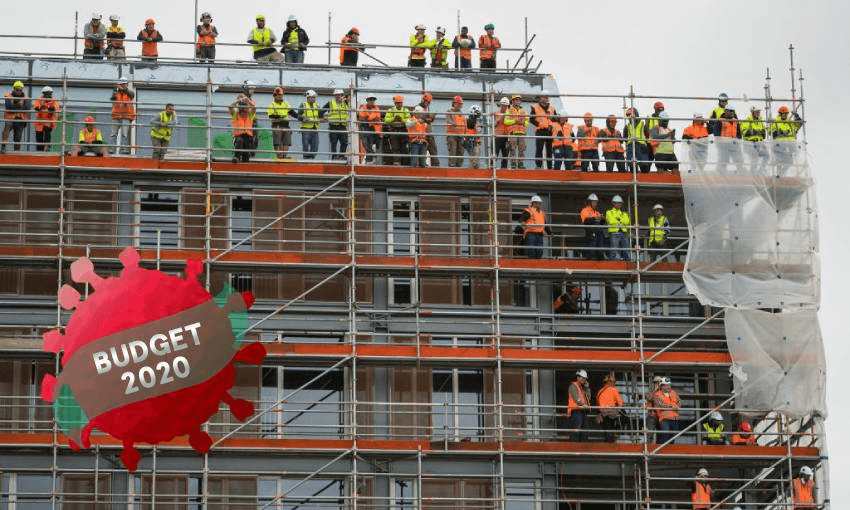Budget 2020: No increase to benefits or wages, but investment in vocational training could future-proof New Zealand’s workers.
The first major Covid-19 stimulus package, equivalent to $12.1 billion, was announced two months ago. It introduced the wage subsidy, a $25 per week increase to benefits, and financial support for leave taken due to Covid-19. At the time, Grant Robertson said this was “just the beginning”. Today, on top of an extension to the wage subsidy came a trades and apprenticeships package, an environmental jobs package, and an extension to the wage subsidy to tide workers over a little longer.
It was a good start, Andrea Black, economist for the New Zealand Council of Trade Unions, told The Spinoff.
“New Zealand went into this low wage, low productivity, high rent, and high carbon,” she said. “A lot of the budget touches on that, but it looks like there’s a focus on jobs, not a focus on wages.” Black said she asked Robertson about wages during today’s budget lock-up, and he pointed to agritech money and research and development as areas where wages could improve. “I don’t naturally feel that they’re super transformational [investments], but they’re absolutely good to have and all in the right direction,” she said.
There’s $20 billion yet to be allocated from the Covid-19 recovery fund, some of which Black hopes will be directed to wages. “CTU would be keen that there is a razor focus on improving the wages of workers in New Zealand, particularly lower-waged ones.”
Black was disappointed not to see any lift in social welfare. “We’re going into 9.8% unemployment, and there are no additional increases to benefits,” she said. Adding to the problem of wages and benefits, she said, was the lack of affordable rentals.
“It was mentioned in Megan Woods’ press statement during the KiwiBuild reset, that she’d be looking to more large-scale instiutional affordable rental schemes, and that’s really important because our people, even the ones who aren’t on the living wage, can’t access social housing because they earn too much,” she said. “And they’re paying high rent, so there’s no way they can save on a deposit for a house.”
“It really didn’t feel there was anything there to address that issue.”
Annie Newman, transformation campaigns director for the E tū union, told The Spinoff she felt that in terms of immediate support, the budget had done well. “The subsidy scheme is critical for workers who are in jobs that are precarious,” she said.
“Workers who are in those jobs are spending money in the local economy. As long as they keep receiving a decent income, they help to keep businesses in local communities flourishing, so it’s critical that continues.”
Newman is hopeful the $1.4 billion investment in trades and apprenticeships training will have a positive impact on those out of work. Among its members are workers in the aviation sector, which has been grounded for the past couple of months. “They’re being made redundant, and the opportunity to have free vocational education gives them a chance to have hope they can re-establish their careers.”
“It’s also an incredibly important part of creating a just transition for workers,” she said, something E tū’s identifies as one of its priorities. As governments combat the climate crisis, industries and even entire economies will change; a just transition means securing workers’ livelihoods throughout this change, she said. “I think that’s quite an exciting part of the budget.”
Like Black, Newman was disappointed on the benefits front. “Not having that boost to benefit levels beyond the amount announced previously, and not embracing more of those welfare advisory group recommendations, such as individualised benefits — that will have a hit on households, and that could have been an important part of the transition package.”
Newman sees the $3.3 billion investment in core services like health and education as the chance to increase wages for workers. “We’re hoping [wage increases] will still happen, through the workers who are contracted to the core public service.”
“Grant Robertson said they’re expecting to have strong public services, and you can’t have that if you’re not prepared to pay people a decent wage,” she said. “And that’s the living wage.”
“We’ll be looking out to see how those workers are being protected against a life of poverty if they are contracted to the core public service. If you’re a cleaner in the Treasury, you should be able to earn enough money to live.”
In a statement earlier today, First Union’s general secretary Dennis Maga strongly criticised the budget for its failure to extend benefits to migrant workers in New Zealand. “Many migrant workers are home in New Zealand; they have been here decades and contributed billions to our economy,” he said. “They call New Zealand home.”
“But it is unfortunately clear that the government is turning its back on more than 300,000 migrant workers in New Zealand by refusing to activate Section 64 of the Social Security Act and extend welfare benefits to those families when they are part of a developing humanitarian crisis.”
“For nation-building projects on the scale required to pull New Zealand’s economy back from the brink, highly-skilled migrant workers in the construction industry will be crucial.”
